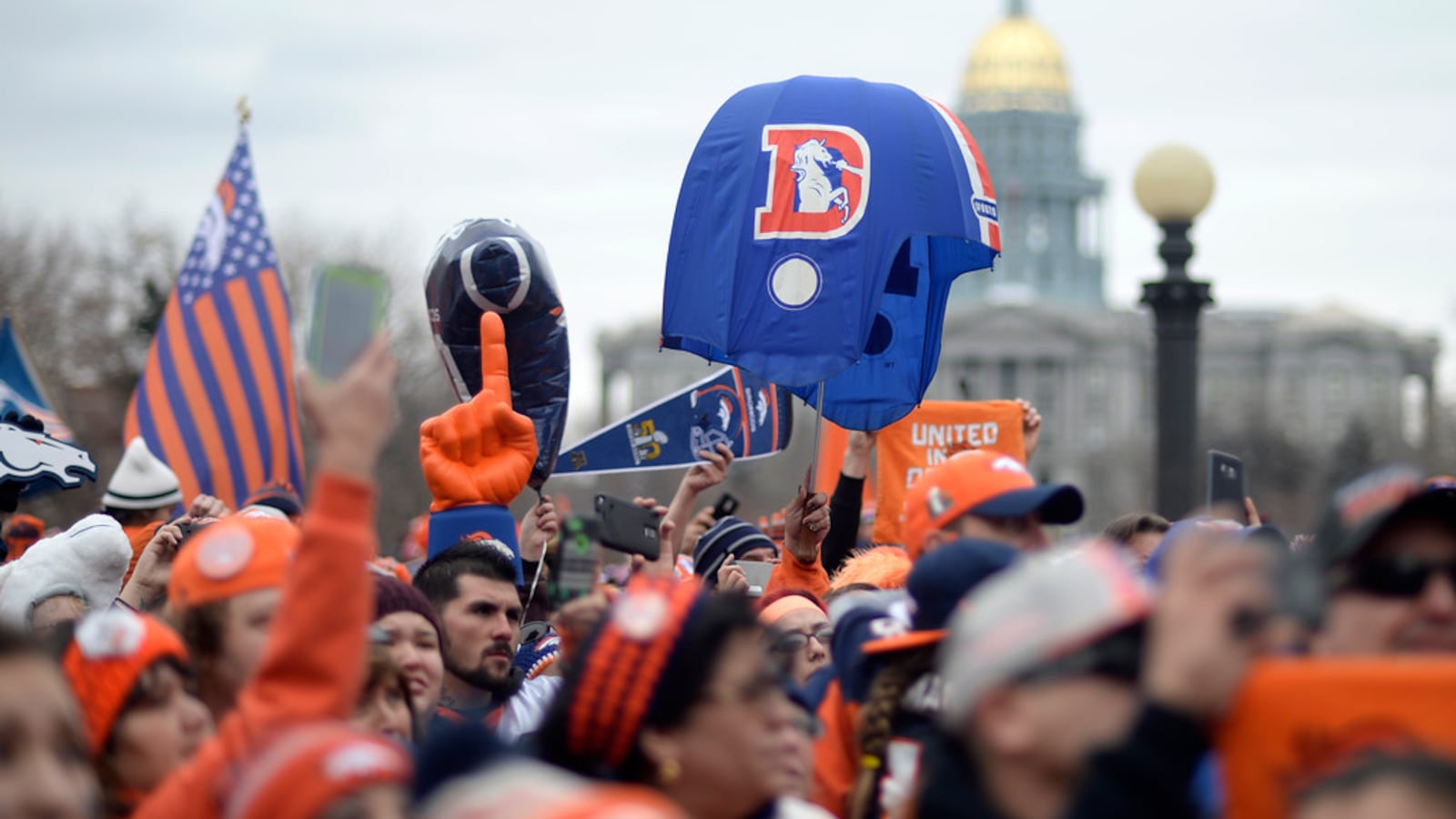At noon Tuesday, tens of thousands of revelers wearing orange and blue will line the streets of downtown Denver for a parade celebrating the Denver Broncos for wrapping the city in Super Bowl glory.
More than a few Colorado students who are supposed to be in school likely will be on sidewalks hoping for a glimpse of the Lombardi trophy, perhaps wearing face paint to conceal their identities from principals watching on TV.
This raises questions: Is it all right for kids to ditch school to revel in the collective community joy that is a world championship? How do you balance the opportunity to bask in what could be a once-in-a-lifetime experience with the possibility of losing out on learning?
Amber Johnson, a mother of two elementary school students and editor of Mile High Mamas, a mom-centric local blog, confessed to conflicting emotions. Growing up in Calgary, Canada, she has fond memories of celebrating her hometown hockey team’s Stanley Cup victory. She is attracted to the idea of creating similar impressions for her children, reared in Broncos Country.
But then other things needle at her, like the fact that she just pulled her fourth grader and sixth grader out of Arvada’s Vanderhoof Elementary just last Friday to go skiing. Or that a four-day weekend looms for the President’s Day observance.
She is leaning toward an education in blue and orange.
“I feel like this could be a once-in-a-lifetime opportunity for the kids to really take part in something cool and special,” Johnson said. “It’s like a few hours of school. Really, in the grand scheme, that’s not a whole lot when it comes to the kind of memories it will bring home.”
Some students and parents aired their intentions — or hopes — on social media:
School districts, by and large, said the expected things about the importance of school attendance.
Denver Public Schools noted in a statement that school was going on as planned, and urged students and staff to “show their support by wearing Broncos orange or blue, as permitted by school dress codes.”
The district asked families pulling their children out of school for the celebration to contact their school and request an excused absence, which district officials are recommending school leaders grant.
DPS acting superintendent Susana Cordova, meanwhile, wrote to principals urging them to contact their supervisors or the district’s safety department if large numbers of students walk out of school unexcused to join the party.
Charlotte Ciancio, superintendent of Mapleton Public Schools in Adams County, which just celebrated a reduction in dropout rates, said: “Although it’s an exciting time for the Broncos and Denver, it is a school day. We have been very intentional in promoting attendance as a key to student success.”
Districts around the country have faced similar situations following major sports championships. After the New York Yankees’ 2000 World Series win, then-Mayor Rudy Giuliani said students should be allowed to play hooky for the parade — as long as they read a book about baseball. Twelve years later, school kids were prominent at the New York Giants’ Super Bowl celebration. A number of Kansas City-area districts cancelled school last fall so students could witness the Royals’ World Series parade.
So what does a genuine expert in the field of school attendance think of the parade paradox?

Hedy Chang, executive director of Attendance Works, which promotes better policy and practice around school attendance, said schools should develop plans to address lost classroom time for students who skip Tuesday and share the plans with parents.
Chang tossed out other ideas. An entire class could take a field trip to Civic Center, where the parade ends and the rally begins. Or teachers could build a math or writing lesson around the Broncos’ victory.
Chang said parents trying to decide whether to take their children out of school should consider what lessons might be missed and ask teachers how they can be made up.
“I think you’re trying to balance community spirit and how to cover what’s lost,” she said.
If a student has an excellent attendance record, missing one day shouldn’t hurt, Chang said.
“This is one day,” she said. “Everyone can recover from that. It’s when absences are a persistent pattern that creates concern.”
Her children’s sparkling attendance record is one reason Lisa Larson is planning on bringing her children — 17, 14 and 12 — to the celebration. Her oldest son — now in his early 20s — attended the 1998 Broncos Super Bowl celebration and it remains one of the essential memories of his childhood, Larson said. He was 5.
“To be honest, no, I don’t worry about it,” she said of repeating the feat all these years later. “I don’t pull my kids out (of school) very often for hardly anything. Once in a while, something comes along …”
Josh Hirsch, a technology teacher at Academy High in Thornton, said he knows some of his students are planning to attend the parade and rally. The number of empty seats will dictate his lesson for the day. He said he does not want to halt the class altogether, or “punish” students who do show up by not giving them a good lesson.
The teacher is also a realist when it comes to a special afternoon for students reared in Broncos Country.
“You can’t always fight every battle,” Hirsch said. “Sometimes you just have to say, ‘Let them have the life experience.’”
Reporter Melanie Asmar contributed information to this report.

